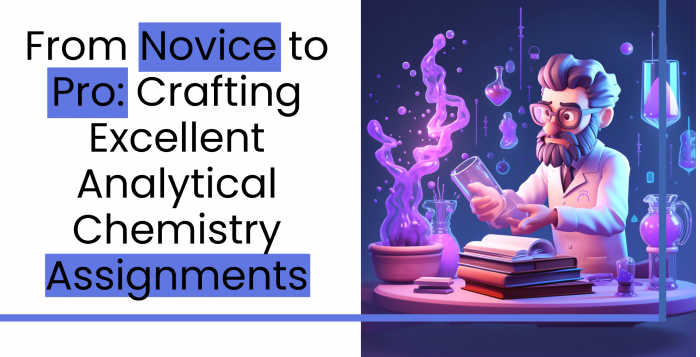From Novice to Pro: Crafting Excellent Analytical Chemistry Assignments
In the realm of analytical chemistry, the pursuit of excellence is a journey that transforms novices into seasoned professionals. Crafting excellent analytical chemistry assignments is not merely about completing a task; it’s about developing a deep understanding of the subject, honing problem-solving skills, and delivering results that stand out. In this comprehensive guide, we will delve into the intricacies of crafting outstanding analytical chemistry assignment writing that are sure to earn top grades and recognition.
The Foundation of Analytical Chemistry
Understanding the Basics
To embark on the path from novice to pro, one must first grasp the fundamental concepts of analytical chemistry. Start with a strong foundation by comprehending the core principles of the discipline. These include qualitative and quantitative analysis, chemical equilibrium, and the various techniques and instruments used in analytical chemistry.
Explore Chemical Reactions
Chemical reactions are at the heart of analytical chemistry. Understanding how substances interact and transform is essential. Delve into topics such as stoichiometry, reaction kinetics, and thermodynamics to gain insight into the underlying processes that drive analytical experiments.
The Art of Problem Solving
Analytical Methodology
A critical aspect of crafting excellent assignments is choosing the right analytical methodology. Analytical methods such as chromatography, spectroscopy, and titration play a pivotal role in chemical analysis. Familiarize yourself with these methods and their applications to tackle assignments effectively.
Data Analysis and Interpretation
Analytical chemistry assignments often involve handling large sets of data. Develop your data analysis skills by learning statistical techniques and graphical representation methods. Proficient data interpretation ensures that your assignments are not just informative but also insightful.
Laboratory Techniques and Safety
Lab Protocols
Safety is paramount in the world of analytical chemistry. Whether you are a student or a professional, adhering to laboratory protocols is non-negotiable. Familiarize yourself with lab equipment, chemical handling procedures, and waste disposal to ensure a safe working environment.
Precision and Accuracy
Crafting excellent analytical chemistry assignments demands precision and accuracy in experimentation. Learn how to calibrate instruments, handle samples, and record data meticulously. These skills will set you apart as a proficient analyst.
Effective Communication
Clear and Concise Reports
In the realm of analytical chemistry, results are meaningful only when they are effectively communicated. Hone your report-writing skills by structuring your assignments with clarity and conciseness. Present your findings logically, and use appropriate figures and tables to enhance comprehension.
Citation and References
Academic integrity is a cornerstone of excellence. Always provide proper citations and references for the sources you use in your assignments. This not only acknowledges the work of others but also strengthens the credibility of your own work.
Staying Updated
Keeping Abreast of Developments
Analytical chemistry is a dynamic field, with new techniques and technologies constantly emerging. To stay ahead of the curve, make it a habit to keep abreast of the latest developments through scientific journals, conferences, and online resources.
Practice Makes Perfect
Solving Practice Problems
One of the most effective ways to enhance your analytical chemistry skills is by solving practice problems. Seek out textbooks, online resources, and assignment examples to challenge yourself and reinforce your understanding.
Conclusion
In conclusion, the journey from a novice to a pro in crafting excellent analytical chemistry assignments is a rewarding one. By mastering the basics, honing your problem-solving skills, prioritizing safety, communicating effectively, and staying updated with the latest advancements, you can set yourself on a path to academic and professional success in the field of analytical chemistry.
Remember, excellence is not an overnight achievement; it’s the result of continuous effort and a commitment to improvement. As you embark on this journey, you will find that your analytical chemistry assignments not only rank high academically but also contribute to your growth as a proficient analytical chemist.



